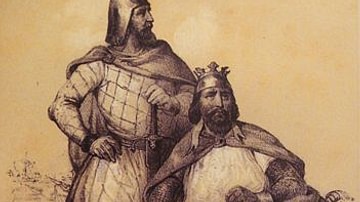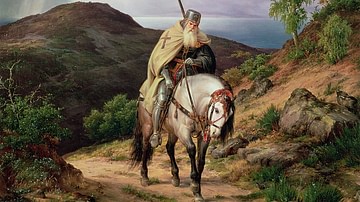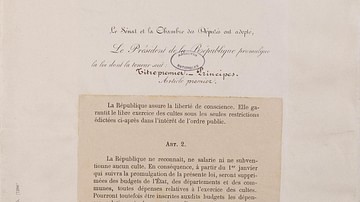Search
Search Results

Video
The Plague of Cyprian (249 to 262 A.D)
This time on the History of the Papacy Podcast's Sidetrack episodes, we will take a closer look at the impact of the Plague of Cyprian on the growth of the early Christian movement. We will see if a major plague can actually help a movement...

Definition
Christianity
Christianity is the world's largest religion, with 2.8 billion adherents. It is categorized as one of the three Abrahamic or monotheistic religions of the Western tradition along with Judaism and Islam. 'Christian' is derived from the Greek...

Definition
Knights Templar
The Knights Templar were established c. 1119 and given papal recognition in 1129. It was a Catholic medieval military order whose members combined martial prowess with a monastic life to defend Christian holy sites and pilgrims in the Middle...

Definition
Carolingian Dynasty
The Carolingian Dynasty (751-887) was a family of Frankish nobles who ruled Francia and its successor kingdoms in Western and Central Europe during the Early Middle Ages. The dynasty expanded from Francia as far as modern Italy, Spain, and...

Definition
Roger I of Sicily
Roger I, also known as Roger Bosso (c. 1031-1101) was a Norman knight and adventurer best known for conquering The Emirate of Sicily during the 11th century. His lifelong efforts helped lay the foundations of a wealthy new Mediterranean state...

Article
The Crusades: Consequences & Effects
The crusades of the 11th to 15th century CE have become one of the defining events of the Middle Ages in both Europe and the Middle East. The campaigns brought significant consequences wherever they occurred but also pushed changes within...

Article
The Crusades: Causes & Goals
The Crusades were a series of military campaigns organised by Christian powers in order to retake Jerusalem and the Holy Land back from Muslim control. There would be eight officially sanctioned crusades between 1095 CE and 1270 CE and many...

Article
Six Great Heresies of the Middle Ages
The medieval Church established its monopoly over the spiritual life of Europeans in the Early Middle Ages (c. 476-1000) and consolidated that power throughout the High Middle Ages (1000-1300) and Late Middle Ages (1300-1500). Along the way...

Article
France’s 1905 Law of Separation of Church and State
The 1905 Law of Separation of Church and State was enacted as the climax of decades of conflict between monarchists and anticlerical Republicans who viewed Christianity as a permanent obstacle to the social development of the Republic. The...

Article
John Knox on Female Leadership
The rule of women in government and ministry has long been a source of controversy in the Christian Church. Beginning with the Apostolic period, female leadership has been embraced and resisted by innumerable people, the debate centering...